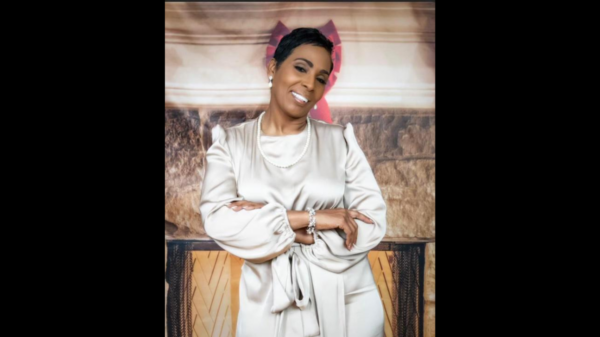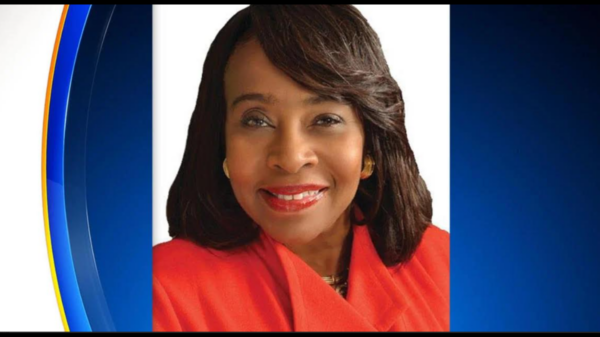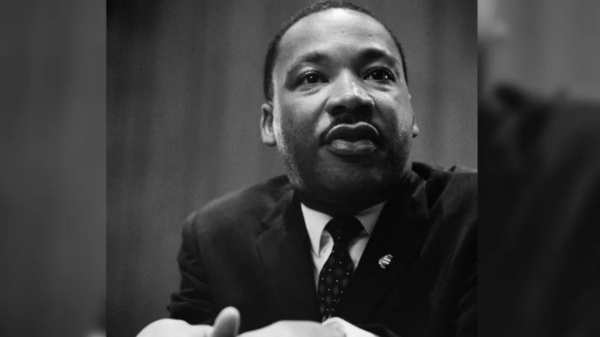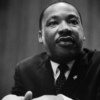
Approximately eleven months before he was assassinated on April 4, 1968, Dr. Martin Luther King Jr. granted an exclusive interview to NBC News’ Sander Vanocur on May 8, 1967, at Ebenezer Baptist Church in Atlanta, Georgia, where he served as pastor.
During this over 25-minute video, Dr. King shared his unfiltered thoughts on the state of Black America, a little less than four years after he delivered his iconic “Normalcy, Never Again” speech (famously referred to as the “I Have a Dream” speech) on the steps of the Lincoln Memorial at the March on Washington for Jobs and Freedom on August 28, 1963.
As Dr. King is interviewed by Vanocur, Dr. King said something striking in response to his question.
Vanocur: When you stood on the Lincoln Memorial, that day in August, ‘63, you said ‘I Had a Dream.’ Did that dream envision that you could see a war in Asia, preventing the federal government doing for the Negroes, preventing the society doing for the Negroes what needed to be done?
Dr. King: That dream that I had that day has in many points turned into a nightmare.
Now I’m not one to lose hope. I keep on hoping. I still have faith in the future. But I’ve had to analyze many things over the last few years, and I would say over the last few months.
I’ve gone through a lot of soul-searching and agonizing moments. And I’ve come to see that we have many more difficulties ahead and some of the old optimism was a little superficial and now it must be tempered with a solid realism.
And I think the realistic fact is that we still have a long, long way to go and that we are involved in a war on Asian soil, which if not checked and stopped, can poison the very soul of our nation.
As the interview was ending, Vanocur asked a follow up question, to which Dr. King kept it real and pointed out the real internal problems in the country concerning the state of Black America.
Vanocur: Dr. King, even if there had not been a war in Asia, would you still not have had this nightmare insofar as the Negro movement for equality then touched on two things the white community holds sacred—their children and their property?
Dr. King: It’s much more difficult to really arouse a conscience during a time of war. I noticed the other day, some weeks ago, a Negro was shot down in Chicago, and it was a clear case of police brutality. That was on page 30 of the paper, but on page 1 at the top was 780 Viet-Cong killed. That is something about a war like this that makes people insensitive. It dulls the conscience. It strengthens the forces of reaction. And it brings into being bitterness and hatred and violence, and it strengthens the military industrial complex of our country, and it’s made our job much more difficult because I think we can go along with some programs if we didn’t have this war on our hands. That would cause people to adjust to new developments, just as they did in the South. They said they’d never ride the bus with us, blood would flow in the streets, they wouldn’t go to school, and all of these things, but when people came to see that they had to do it because the law insisted, they finally adjusted. And, I think white people all over this country will adjust once the nation makes it clear that in schools, in housing, we’ve got to learn to live together as brothers.
I think the biggest problem now is we got our gains over the last 12 years at bargain rates, so to speak. It didn’t cost the nation anything. In fact, it helped the economic side of the nation to integrate lunch counters and public accommodations. It didn’t cost the nation anything to get the right to vote established. Now, we’re confronting issues that cannot be solved without costing the nation billions of dollars. Now I think this is where we’re getting our greatest resistance.
They may put it on many other things, but we can’t get rid of slums and poverty without it costing the nation something.
Dr. King shifted his initial viewpoint of the “dream” he spoke about in 1963, versus the current reality of where he saw things after the Civil Rights Act of 1964 and Voting Rights Act of 1965.
There appeared to be a visible awakening in Dr. King—a major pivot towards acknowledging the realistic need for African Americans to obtain racial, social, and economic equality.
As we celebrate the life and legacy of Dr. King, let us never forget his words and his transformational challenge given to all American citizens to address the inequities and systematic issues that continue to plague the African American community in this country.
Let’s take a look at how things have changed—or not—since Dr. King delivered these remarks during this profound interview over 56 years ago, and compare Dr. King’s views on select issues that he consistently sought to address, and where we are today on those issues.

KING ON EDUCATION
On March 14, 1964, Dr. King was honored by the United Federation of Teachers and given the John Dewey Award. During his acceptance speech, Dr. King spoke about the importance of education to African Americans in this country and its tie to equality. Dr. King stated:
“It was not fortuitous that education became embroiled in this conflict.
Education is one of the vital tools the Negro needs in order to advance. And yet it has been denied him by devises of segregation and manipulations with quality.”
Dr. King went on to say:
“The richest nation on Earth has never allocated enough resources to build sufficient schools, to compensate adequately its teachers, and to surround them with the prestige our work justifies.
We squander funds on highways, on the frenetic pursuit of recreation, on the overabundance of overkill armament, but we pauperize education.”
As we look at Dr. King and the state of Black America in the 1960s, with a push for integrated schools and resources, things have not really gotten any better for Black people current day.
According to the United Negro College Fund’s K-12 Disparity Facts and Statistics page on their website, college degrees are considered a primary vehicle for reducing poverty and closing the wealth gaps between African Americans and whites, however statistics reveal that there are significant disparities that exist that hinder Black people more than whites.
Let’s look at some of the key findings from their research.
- African American students are less likely than white students to have access to college-ready courses. Statistics showed that only 57 percent of Black students have access to a full range of math and science courses necessary for college readiness, compared to 81 percent of Asian American students and 71 percent of white students.
- Even when Black students do have access to honors or advanced placement courses, they are vastly underrepresented in these courses. Black and Latino students represent 38 percent of students in schools that offer AP courses, but only 29 percent of students enrolled in at least one AP course.
- Black and Latino students have less access to gifted and talented education programs than white students.
- African American students are often located in schools with less qualified teachers, teachers with lower salaries and novice teachers.
- Research has shown evidence of systematic bias in teacher expectations for African American students and non-Black teachers were found to have lower expectations of Black students than Black teachers.
- African American students are less likely to be college-ready. In fact, statistics showed that 61 percent of ACT-tested Black students graduating from high school met none of the four ACT college readiness benchmarks, nearly twice the 31 percent rate for all students.
- Black students spend less time in the classroom due to discipline, which further hinders their access to a quality education.
- Black students are nearly two times as likely to be suspended without educational services as white students. Black students are also 3.8 times as likely to receive one or more out-of-school suspensions as white students. In addition, Black children represent 19 percent of the nation’s pre-school population, yet 47 percent of those receiving more than one out-of-school suspension. In comparison, white students represent 41 percent of pre-school enrollment but only 28 percent of those receiving more than one out-of-school suspension. Even more troubling, Black students are 2.3 times as likely to receive a referral to law enforcement or be subject to a school-related arrest as white students.
- Black and Latino students are often concentrated in schools with fewer resources. Schools with 90 percent or more Black and Latino students spend $733 less per student per year than schools with 90 percent or more white students.
- According to the Office for Civil Rights, 1.6 million students attend a school with a sworn law enforcement officer (SLEO), but don’t even have a school counselor.
- Statistics showed that the average reading score for white students on the National Assessment of Educational Progress (NAEP) 4th and 8th grade exam was 26 points higher than Black students. Similar gaps are apparent in math. The 12th grade assessment also showed alarming disparities as well, with only seven percent of Black students performing at or above proficient on the math exam, compared to 32 percent white students.
With these alarming statistics, coupled with legislation (critical race theory, vouchers, public school takeovers, etc.) that are sweeping across the country, especially in Texas, it is clear African Americans still have a long way to go to wake up from this educational nightmare.
Dr. King would undoubtedly be on the frontlines addressing education if he were alive today.
KING ON VOTING RIGHTS
Dr. King was a strong advocate for Black people obtaining the unfettered and unhindered right to vote.
On May 17, 1957, Dr. King delivered a speech at the Prayer Pilgrimage for Freedom before the Lincoln Memorial, demanding those rights be granted. Dr. King stated:
But, even more, all types of conniving methods are still being used to prevent Negroes from becoming registered voters. The denial of this sacred right is a tragic betrayal of the highest mandates of our democratic traditions and it is democracy turned upside down.
So long as I do not firmly and irrevocably possess the right to vote, I do not possess myself. I cannot make up my mind — it is made up for me. I cannot live as a democratic citizen, observing the laws I have helped to enact — I can only submit to the edict of others.
Dr. King also provided an interesting connection between registered voters and the criminal justice system that is eerily similar to what African Americans are experiencing today, stating:
“There are more Negroes in jail with me than there are on the voting rolls.”
As we look at some of today’s legislation that has stifled the rights to vote for Blacks, it is clear that restricting and impacting the ability of Black people to vote remains a focal point.
The failure of Congress to pass the John Lewis Voting Rights Advancement Act, which would update and modernize the Voting Rights Act of 1965, while also strengthening much-needed legal protections against discriminatory voting policies and practices in states across the country, is an example of the nightmare African Americans continue to experience.
Last year, the Forward Times reported on a controversial bill that Republican Texas Governor Greg Abbott recently signed into law that are examples of the continued nightmare.
As of September 1st, Senate Bill 1933 (SB1933) gave the Texas Secretary of State’s office the unchecked power to take over any elections where the population that is specified in the legislation would only apply to Harris County—which has a large concentration of registered Black voters.
According to the verbiage in the bill, anyone who participated in an election in Harris County and doesn’t like the outcome can lodge a complaint, such as a political candidate, voter, or political party chair, and if the Texas Secretary of State has “good cause to believe that a recurring pattern of problems with election administration or voter registration exists in the county,” they can take over the elections and even order a new election. In other words, the Texas Secretary of State can order a new election in Harris County if they believe that more than 2 percent of polling places in the county ran out of ballot paper for more than one hour. They will also have the power to approve or reject any instituted election policy or procedure and fire election officials at the end of an oversight period they conduct.
It is clear, especially after reading the original bill that was introduced that would have been applicable to all Texas counties, that this was clearly an attempt to target Harris County, which is a Democratic juggernaut and heavily populated with African Americans and people of color.
Dr. King would undoubtedly be on the frontlines addressing voting rights if he were alive today.
KING ON FAIR AND EQUITABLE HOUSING ACCESS
Dr. King was adamant about addressing the inequities in fair housing.
In a speech at Chicago Soldier Field Stadium in 1966, as part of the Chicago Open Housing Movement, Dr. King stated:
“We are here today because we are tired. We are tired of paying more for less. We are tired of living in rat-infested slums… We are tired of having to pay a median rent of $97 a month in Lawndale for four rooms while whites living in South Deering pay $73 a month for five rooms. Now is the time to make real the promises of democracy. Now is the time to open the doors of opportunity to all of God’s children.”
Access to affordable and accessible housing has always been an issue for Black Americans.
Housing and land discrimination has negatively impacted Black people in this country for over a century.
According to the research group, Mapping Prejudice, the first racially-restrictive deed (also known as redlining) originated in Minneapolis, Minnesota, in 1910. A common deed restriction was that the “premises shall not at any time be conveyed, mortgaged or leased to any person or persons of Chinese, Japanese, Moorish, Turkish, Negro, Mongolian or African blood or descent.”
During the 1930s, federal housing administrators required this language for federally-financed projects and eventually, banks and lenders began to use these deed restrictions to justify their decisions to provide or deny loans to certain neighborhoods, particularly as it related to Black and/or racially-mixed neighborhoods.
Although the Supreme Court made these types of deed restrictions containing racially-centered language unenforceable in 1948, and although the U.S. Congress passed the Fair Housing Act in 1968, to completely ban racial discrimination in deed restrictions, discriminatory actions have continued for decades since.
Black people still have challenges getting housing and are being priced out of their homes due to skyrocketing property values and gentrification.
According to a report released by the National Low Income Housing Coalition (NLIHC) entitled The Gap: A Shortage of Affordable Homes, Texas ranks the sixth-worst state in the U.S. for affordable housing for extremely low-income renters, with Houston ranking the fifth worst metropolitan city in the country.
Also, the Texas Affiliation of Affordable Housing Providers (TAAHP)—a non-profit trade association that serves as the primary advocate and leading resource for the affordable housing industry in Texas—highlighted key facts from the report, relative to the immediate need for more affordable housing in Texas, and across the Greater Houston area, such as:
- Twenty-two percent of all Texas rental households are extremely low income.
- 79% of all Texas rental households are severely cost burdened, meaning they spend over half their income on housing.
- Only 25 rental units per 100 units are affordable and available for extremely low-income households.
- There’s a shortage of 864,338 affordable and available units for households living at or below 50% AMI {Area Median Income (AMI) is generated by the U.S. Department of Housing and Urban Development (HUD)}
- Between 2019 and 2021, the lack of affordable and available rental homes for very low-income renters (at or below 50% AMI) worsened by more than 164,591 units, or 24%.
- In Houston’s Metropolitan Statistical Area (MSA), there are 19 affordable and available rental homes for every 100 extremely low-income renter households.
Dr. King would undoubtedly be on the frontlines addressing fair and equitable housing access if he were alive today.









You must be logged in to post a comment Login